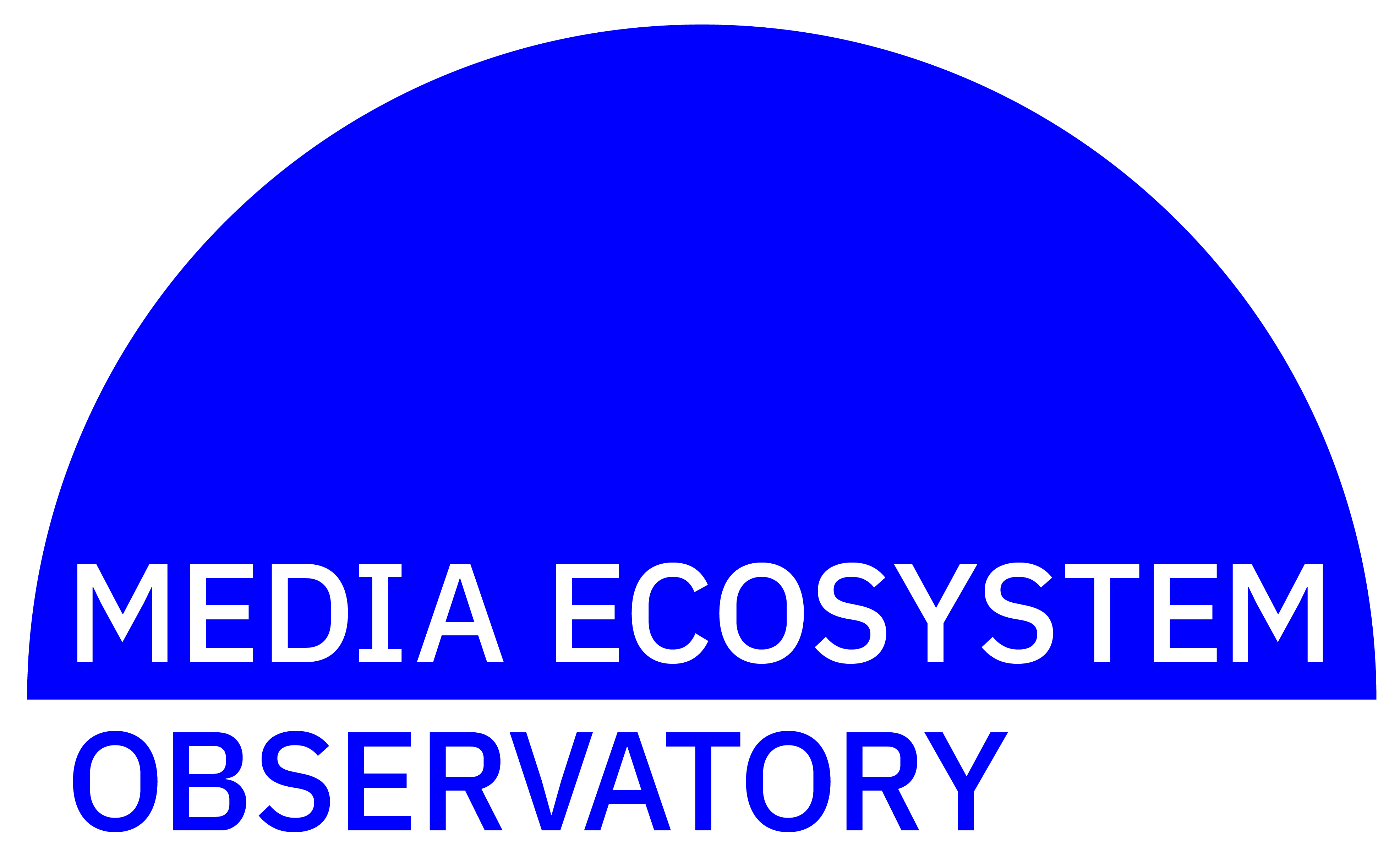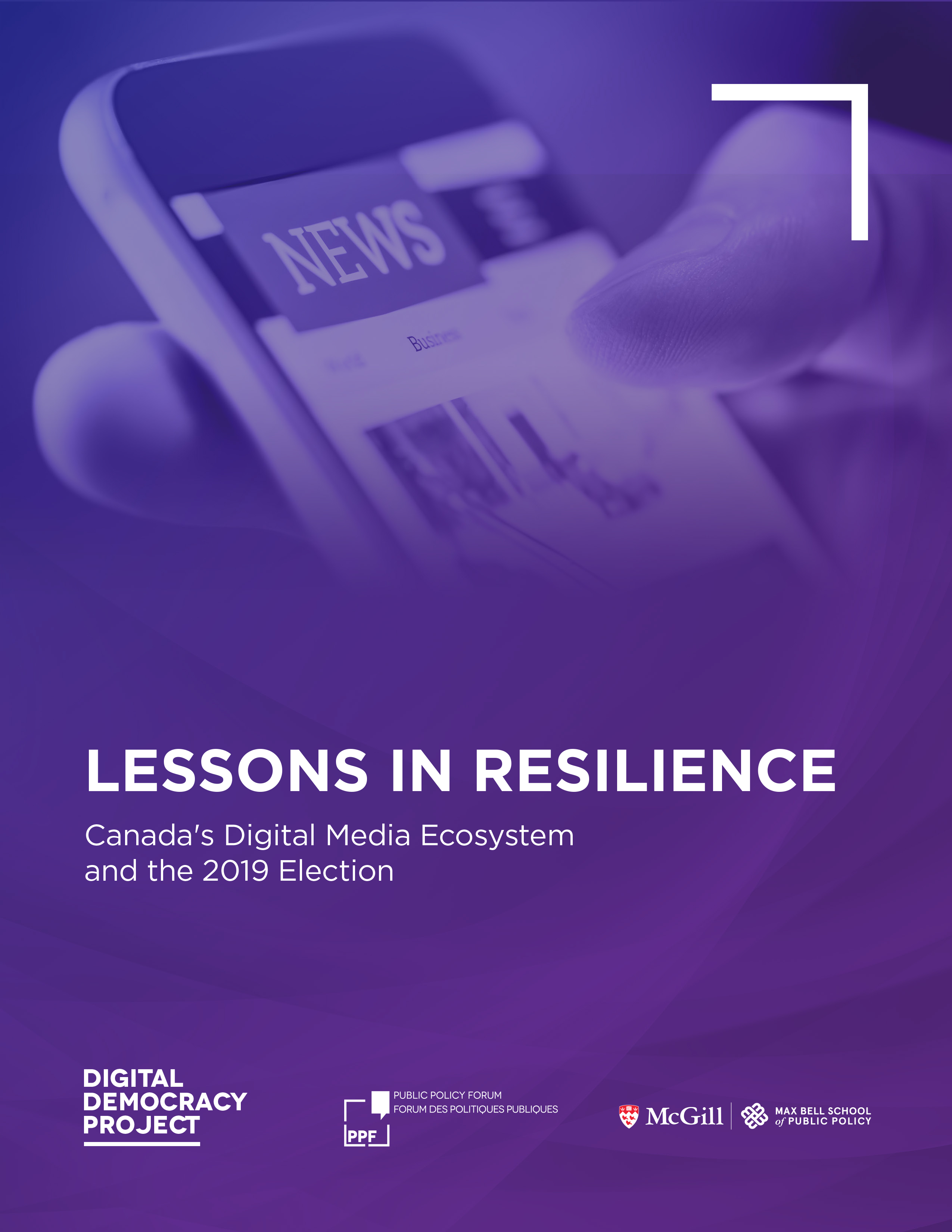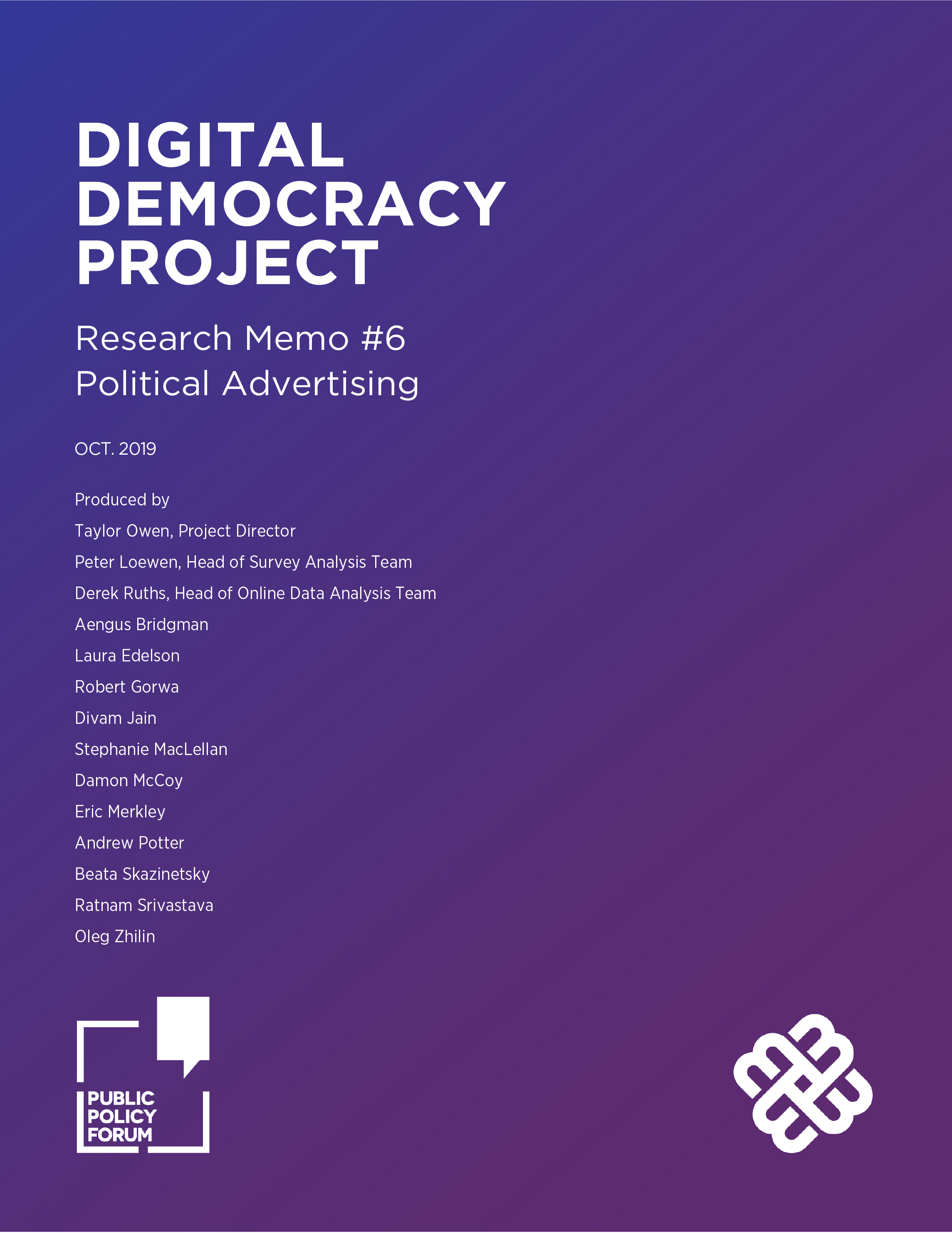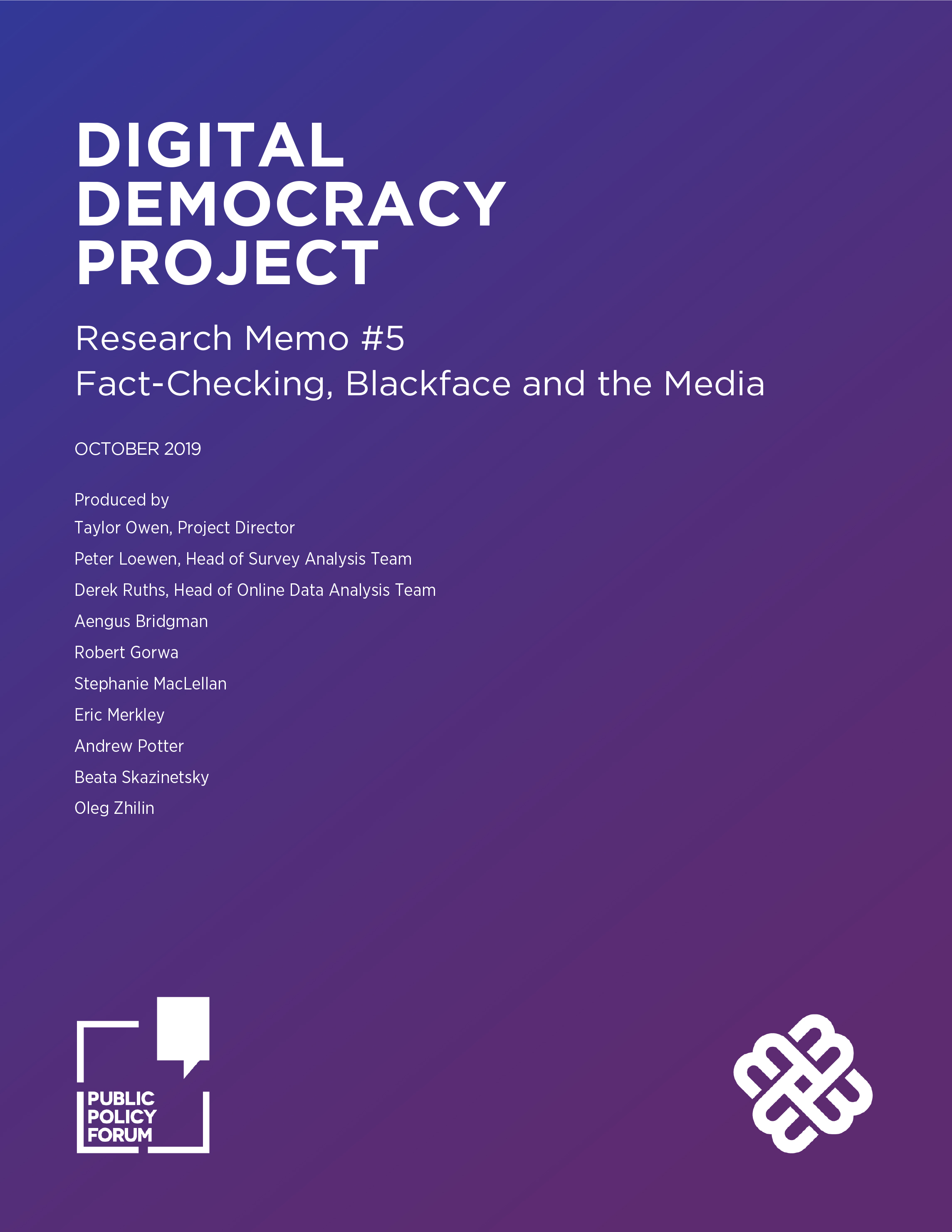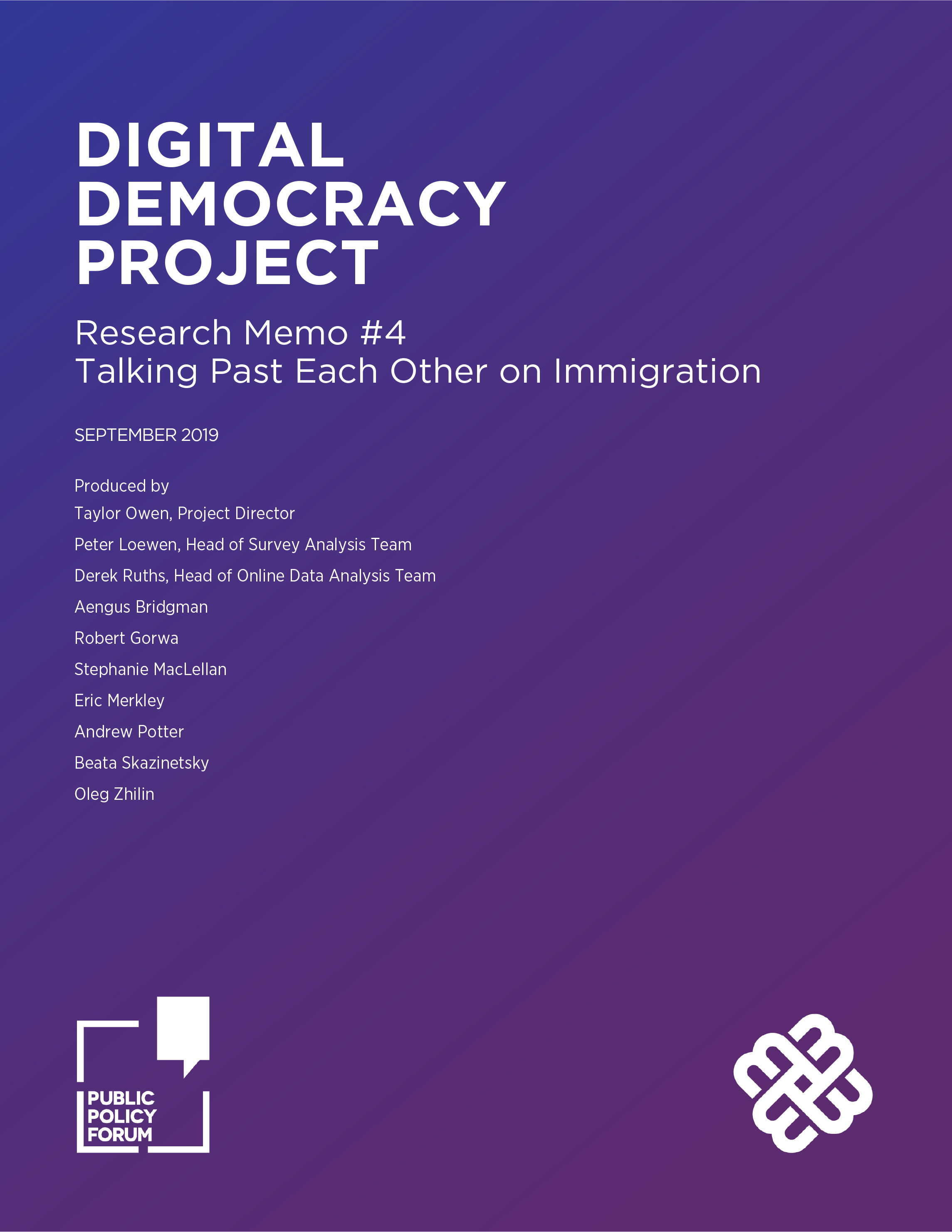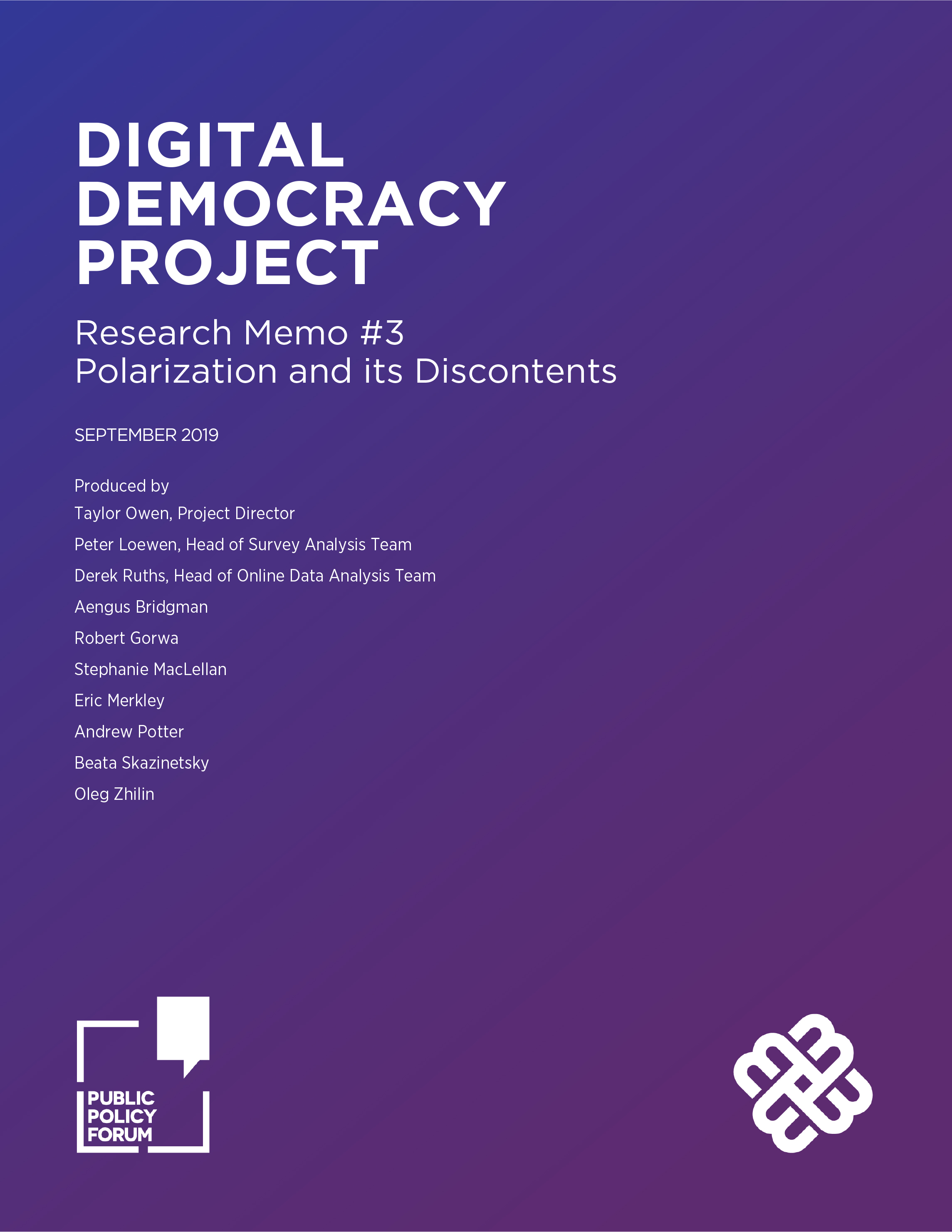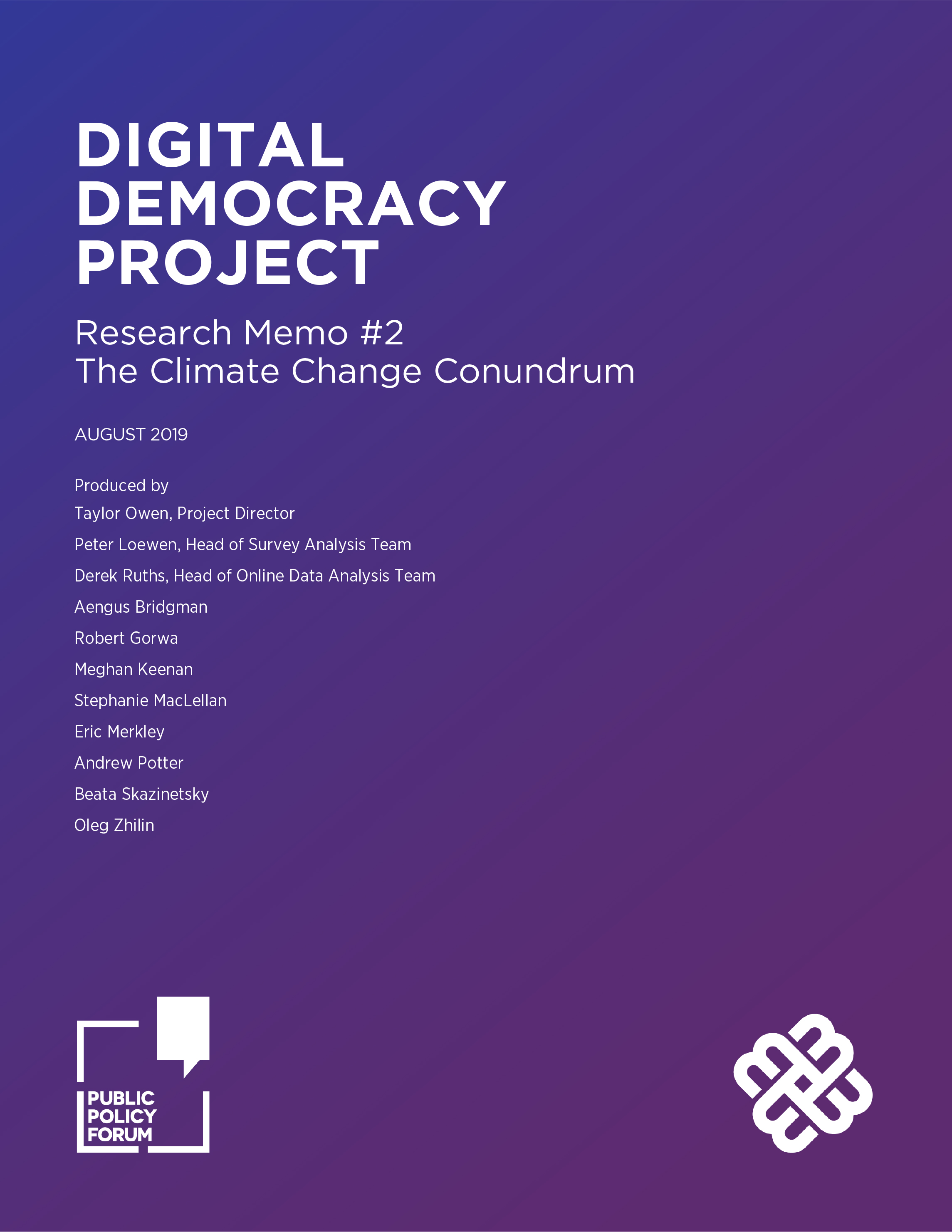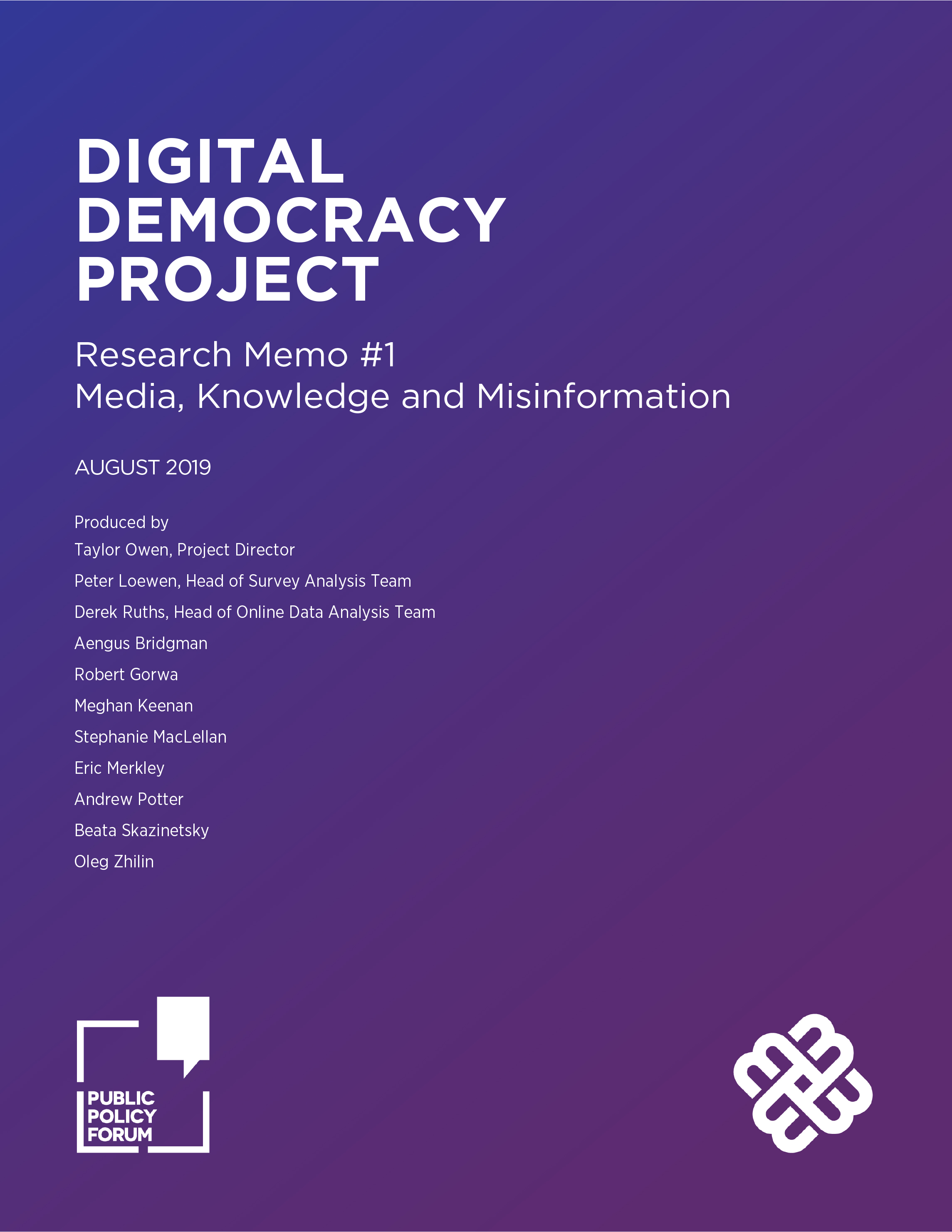The core team of the MEO worked in a partnership with the Public Policy Forum on the Digital Democracy Project during the 2019 Canadian Federal Election.
The project studied the media ecosystem in the run-up to and during Canada’s October 2019 federal election by monitoring digital and social media and by conducting both regular national surveys and a study of a metered sample of online consumption. The project communicated research findings publicly on a regular basis from August to October 2019 (reports below), and will issue a final report in April.
The project was funded by the Rossy Family Foundation, the McConnell Foundation, and the Luminate Group. The project also participated in the Digital Ecosystem Research Challenge, a collaborative research project led by Taylor Owen and Elizabeth Dubois, and funded by a grant from Heritage Canada. The DDP shared survey and online data with 18 research projects funded through the collaboration.
LESSONS IN RESILIENCE: Canada's Digital Media Ecosystem and the 2019 Election
The Canadian political information ecosystem is likely more resilient than that of other countries, in particular the U.S., due to a populace with relatively high trust in the traditional news media, relatively homogenous media preferences with only a marginal role for hyperpartisan news, high levels of political interest and knowledge, and — despite online fragmentation — fairly low levels of ideological polarization overall. While we do find affective polarization, which involves how individuals feel about other parties and their supporters, we find less polarization on issues, which has been a key point of vulnerability in other international elections.
Despite some worries about automated activity being used to game trending hashtags on Twitter or the presence of a few disreputable online outlets, our research suggests their impact was limited. While there remain significant blind spots in the online ecosystem caused by limited data access for researchers, based on the communication we could see, we did not find evidence of any impact attributable to a coordinated disinformation campaign.
Looking forward, however, we find evidence to suggest potential future vulnerabilities, most of which are related to growing partisanship and polarization, as well as the segmentation of the populace into online information environments that reinforce existing world views.
Research Memo #7: The Partisan Playground
One of the goals of the Digital Democracy Project has been to track the digital media environment in order to identify potential threats to Canadian democracy. Our previous reports have shown that social media does not likely contribute to political polarization in Canada, and that Canadians generally trust the traditional news media, with even strong partisans more likely to engage with mainstream outlets on social media than media sites that cater to the fringes. Moreover, the more partisan and fragmented discourse found online is not necessarily reflected in the attitudes and beliefs of the mass population. Despite this positive news, our final report of this election period—which draws on data collected over the past three months—suggests that the information environment continues to have key vulnerabilities. Partisans, who are the most active citizens during election periods, tend to favour sharing and consuming content conducive to their existing worldviews and engage less with other perspectives.
Research Memo #6: Political Advertising on Facebook
The Liberal Party outspent the Conservatives on Facebook. They also chose more narrowly targeted ads compared to the Conservatives’ “broadcast”-style strategy.
The highest-spending partisan third-party group, by far, was Canada Proud.
Troublingly, we found at least two advertisers purporting to show “fact checks” that were actually partisan advertisements.
Canadians do not seem to prefer positive ads to negative ads. Negative ads do drive up negative perceptions of the party that is targeted, but also of the party that pays for the ads.
Positive political ads appear to reduce affective polarization—dislike of parties or their supporters on the other end of the political spectrum simply because they belong to an opposing group.
Research Memo #5: Fact-Checking, Blackface and the Media
If there is a general theme emerging from these Digital Democracy Project reports, it is that much of the received wisdom about the current state of the media and democracy is, if not false, at least poorly supported by the available evidence. For example, contrary to popular belief, Canadians do not live in media-driven partisan echo chambers, and their trust in mainstream media remains quite high. And while there is some evidence of political polarization, that appears to be driven largely by the parties themselves and not by the media.
The good news, then, is that there appears to be a great deal of room for the media to play a valuable and constructive role in sustaining good-faith democratic engagement. This week’s report builds on these themes in two ways.
First, we have new survey results that suggest that there is a great deal of support among Canadians for fact-checking, and that it can be effective. Yet while fact-checking is a practice that has long been considered part of the bread and butter of accountability journalism, there is little evidence that journalist-based fact checking is more effective than any other means.
Second, a data-driven analysis of Justin Trudeau’s blackface controversy shows that the initial flood of online activity was marked by widespread sharing of solid journalism. As the initial interest in the story waned, further activity consisted by and large of conservatives talking among themselves, with little evidence of the conversation being influenced by inauthentic actors.
Research Memo #4: Talking Past Each Other on Immigration
Since the Digital Democracy Project began surveying Canadians earlier this summer, immigration has consistently ranked around the middle of the list of political issues of concern to the public. Canada has a long history of embracing immigrants and refugees, but with rising populist and nativist sentiment in the United States and Europe—and the emergence of the People’s Party of Canada at home—politicians and analysts have been watching closely to see if immigration is becoming a consequential election issue.
The short answer is that it is starting to, though not in the strictly polarizing manner that is usually feared. The good news is that Canadians across the political spectrum have somewhat complex and nuanced views on immigration, and that these views can be influenced by relevant information (such as the correct number of immigrants being admitted into the country.)
The bad news, perhaps, is that because the politics of immigration is so multi-dimensional, it means much of the public debate around it tends to be at cross purposes.
Research Memo #3: Polarization and its Discontents
Researchers, pundits and armchair analysts have argued for some time now that Canada is becoming more like the United States when it comes to polarization—typically understood as the segmenting of society into increasingly isolated and mutually incomprehensible political tribes. It is also common to see at least some of the blame for polarization placed on the media, where increasingly partisan social media echo chambers amplify disagreement and distort the public conversation.
Yet while there is some evidence that Canadians are polarized, according to our data, the story is a bit more complicated than is often assumed. In particular, the usual narrative of social media-based echo chambers driving real-world polarization is not supported by our survey and online data. Yes, some small subset of Twitter users tend to create online echo chambers, but our survey findings suggest that the offline impact is very limited.
Ultimately, the biggest driver of polarization seems to be ideology and partisanship themselves. As our political parties have become more ideologically distinct, their strongest partisans have tended to feel more distant from each other. This echoes one of our findings from our first research memo: it is the media consumers with strong partisan tendencies who are more likely to become misinformed with news exposure, especially via social media.
Research Memo #2: The Climate Change Conundrum
Over our first two surveys, two clear electoral issues are emerging: climate change (for Liberals and the left-leaning parties) and ethics (for the Conservatives). But if the Conservatives are having trouble finding an audience for ethics concerns, even among their core supporters, the Liberals appear to have an even more difficult conundrum: The very people who actually believe in their main issue don’t appear to have much interest in doing anything about it.
Research Memo #1: Media, Knowledge and Misinformation
Consumption of traditional print, broadcast and online media remains relatively high across partisan lines. Alternative media sources that cover politics from an overtly ideological perspective are more prevalent on Twitter than among the general public.
Canadians are somewhat trusting of traditional news outlets as a source for political news, especially compared to political parties and social media.
Exposure to both mainstream media and, to a greater extent, social media is associated with higher levels of misinformation. One key point of vulnerability is the greater tendency of media consumers with strong partisan tendencies to become misinformed with news exposure, especially via social media.
The environment has emerged as the dominant policy issue for Canadians, though markedly less so for Conservative party supporters. The topic was also prominent among political candidates and journalists on Twitter.
However, other issues that the public identified as important—such as healthcare and the economy—were less likely to be discussed by candidates and journalists.
